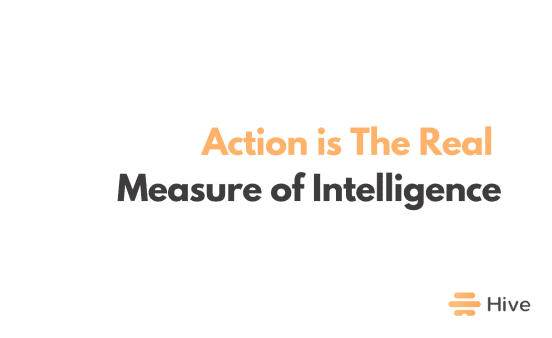You get nowhere if you know the path but don’t walk it.
I like what Ralph Waldo Emerson once said, “An ounce of action is worth a ton of theory.”
While action is not the only test of intelligence, a strong bias towards action is life-changing.
Progress depends on it.
Knowledge is power, but non-action is a dangerous vice.
People who consistently put knowledge to work tend to be happier, healthier, and wiser.
The goal of a good life is to practice good habits. What’s the point of great self-help books if you are not ready to apply what you learn?
Napoleon Hill, best known for his book Think and Grow Rich once said what truly defines intelligence is not just knowledge or brainpower but the ability to take action.
“Action is the real measure of intelligence,” he famously said.
When you take action, you learn from experience, gain valuable insight, and develop practical skills for life.
Even the smartest person in the room can be left behind without action.
Taking action demonstrates practical intelligence and builds confidence, resilience, and adaptability.
Intelligence is not so much about what you know or understand but about what you do with what you know. It’s also about the ability to apply what you know to solve problems and make better decisions.
For example, someone who knows a lot about nutrition but doesn’t put that knowledge into practice by eating a healthy diet is not necessarily “intelligent” in the practical sense.
People who know how to manage stress are more likely to maintain good mental and physical health. But what’s the use of that knowledge if you don’t apply it to help yourself stay calm in a chaotic world?
Prove your intelligence through your actions
There are many examples of people who have proven their intelligence through their actions.
For example, Albert Einstein was not a particularly good student in school, but he went on to become one of the most brilliant physicists of all time.
He developed the theory of relativity, which changed the way we understand the universe.
Thomas Edison was not a particularly well-educated man, but he became one of the most prolific inventors in history.
He held over 1,000 patents, including the light bulb and the phonograph.
It’s easy to talk about what we want to do or think we should do, but it’s another thing entirely to follow through with our intentions.
The willingness and ability to take action sets successful people apart from those who simply talk a good game.
Putting knowledge into practice can also help you develop wisdom.
“By three methods we may learn wisdom: First, by reflection, which is noblest; Second, by imitation, which is easiest; and third by experience, which is the bitterest,” Confucius said.
You become more thoughtful and deliberate in your choices by learning from experience and reflecting on your actions.
It leads to better outcomes and a deeper understanding of yourself and the world around them.
Applying what you learn can also help you feel more fulfilled and engaged.
When people feel like they are making progress towards their goals, it can boost their sense of well-being and satisfaction.
The ability to apply your knowledge and intelligence in a practical way is a hallmark of success.
Life gets better when you walk the path
“The world has the habit of making room for the man whose actions show that he knows where he is going,“ Hill said.
Success comes to those who are confident and determined in their actions. If you can demonstrate that you have a clear sense of purpose and direction, the world will open up opportunities for you.
Knowing where you’re going doesn’t necessarily mean having every detail of your life mapped out.
But it’s a good start — that’s how you build momentum.
Because even the smallest action can start a good snowball effect — a situation in which one action or event causes many similar actions.
Focusing on taking better actions is a great way to improve and grow in almost every area of your life.
While it’s important to think things through and have a plan, you have to take action to achieve results at some point.
Remember, even a small amount of activity is better than none at all and can lead to meaningful progress over time.
